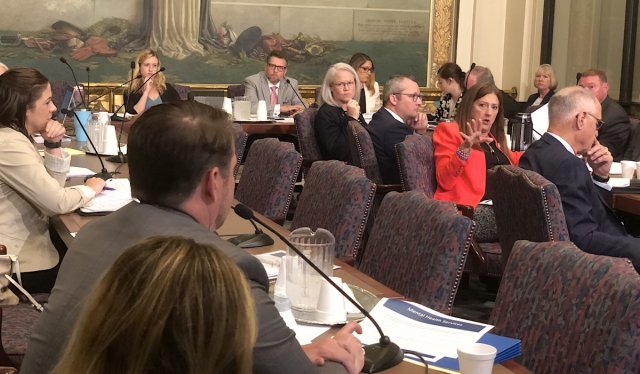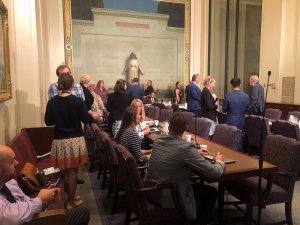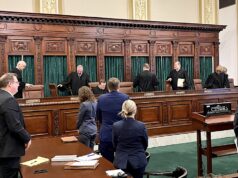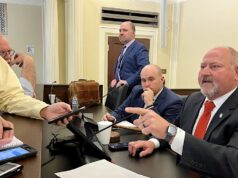
When nurse practitioner Cynthia Roe was working weekends for the Lindsay Municipal Hospital, she often cared for Oklahoma Department of Corrections inmates who were admitted for treatment. Twice, she encountered women with cancer who revealed a shocking story.
“They specifically told me that they violated their parole because they didn’t have insurance,” said Roe (R-Lindsay). “They were outside, their cancer came back and they couldn’t afford to have it treated.”
While she said she never looked into the two women’s backgrounds, Roe relayed that story Wednesday at the second meeting of the Oklahoma Legislature’s joint health care working group.
“That bothers me a lot that somebody would chose to go back to prison just to get treatment for the cancer they otherwise could not get treatment for,” she told her legislative colleagues and agency staffers from the Oklahoma Department of Corrections and the Oklahoma Health Care Authority. “(And) it distresses me greatly that there are only 49 infirmary beds for the state (prison population).”
Rep. Marcus McEntire (R-Duncan) led Wednesday’s meeting with co-chairman Sen. Greg McCortney (R-Ada) out of town for a conference. He also discussed the strain placed on the health care system when people emerge from prison without health insurance.
“I think it’s something that we need to be looking seriously at addressing,” McEntire said after the meeting. “If somebody has health care up until the time they are discharged, then where are they going to go (next) for their health care? And what are the costs associated with that? Can they even afford it? Do those pressures of cost actually increase recidivism?”
McEntire said lawmakers “just don’t know” the answer to that question despite having an inkling of what common sense would tell them.
“This health work group is focused on increasing health outcomes in the state of Oklahoma and increasing people taking control of their own health care,” he said. “So with that in mind, this is a population that often times doesn’t really get spoken about.”
The Eighth Amendment and ‘assumptions’
During Wednesday’s presentation, McEntire used the U.S. Constitution to make his point by asking a question of Clint Castleberry, director of health services for the Oklahoma Department of Corrections.
“The Eighth Amendment of U.S. Constitution guarantees the right of health care to those who are imprisoned, but when they get out there is no such requirement, is that right?” McEntire asked.
RELATED
Health care working group gets overview at first meeting by Archiebald Browne
Castleberry answered cautiously: “I’m not sure the appropriate authority to comment on the Eighth Amendment.”
McEntire replied: “Well, that’s what it says, so ….” That drew a more direct response from Castleberry.
“They have a right to health care,” Castleberry said.
Castleberry provided lawmakers an overview of DOC’s health care costs — $43.5 million for FY 2018 — and legislators talked briefly about whether Oklahoma might pursue a federal waiver to provide better continuity of care for those transitioning out of prison.
Castleberry said that when he speaks to his counterparts in other states, those like Oklahoma that have not pursued the Medicaid expansion options available under the Affordable Care Act face similar difficulties.
“Those who are expansion states — and it does depend how expansion is done — can qualify a greater number of individuals who are in a halfway house setting,” Castleberry said, referencing Ohio and New York specifically.
But Senate Floor Leader Kim David (R-Porter) challenged Castleberry’s statement.
“It sounded to me like you were making an argument that if we had Medicaid expansion it would prevent a lot of our inmates being discharged from prison from ending up in emergency rooms,” she said. “Do you have some statistics to back up that argument?”
Castleberry said he did not and had been unable to speak directly with his contact in New York this week.
“Their argument is that the same population that is discharging from facilities are likely the same that did not have some sort of benefit in place,” he said.
“OK,” David said before turning to those seated near her and saying: “A lot of assumptions.”
After the meeting, she elaborated.
“It concerns me when I have people presenting on a group like this on assumptions and they don’t have any factual data to back up what they are saying,” David said. “Especially when it’s a state agency that sounded like they were advocating for Medicaid expansion, but a lot of the things he was using to advocate were based on assumption.”
‘We didn’t do anything’ in the Legislature
David was not the only state senator who left Wednesday’s meeting slightly frustrated, but Sen. George Young (D-OKC) had a different set of concerns.
“This exercise, really, I’ve never found out what the outcome is supposed to be,” Young said. “I don’t know at this point except that we are meeting to get information. I thought eventually we’d be getting to where we could take a position on something that would make an impact on the state of Oklahoma.”
For Young, that “something” would include expanding Medicaid eligibility to low-income adults under the state-federal partnership program.
“If you expanded Medicaid, what you’d have at that point is the ability for someone to offset the costs and concerns of health care in their life,” Young said. “Which then would put them in position to be able to build a life, which would then put them in a position to come off of Medicaid.”
Young said he is supporting State Question 802, a proposed constitutional change to set Medicaid eligibility at 133 percent of the Federal Poverty Level.
“Why did the citizens have to do that? Because we didn’t do anything (in the Legislature),” Young said. “I think part of this group today is a response to that. I think they want to avoid having that question pass and not having any control. I believe that’s what this is about.”
McEntire, Roe and David each said they oppose SQ 802.
“I’m not in favor of the state question because I have fought for years to make great changes in the state of Oklahoma,” David said. “Unless we’re willing to change how we do things in the state, then expanding a broken system doesn’t get us better outcomes.”
David criticized Oklahoma’s fee-for-service model for Medicaid.
“We don’t focus on results,” she said. “I can get behind a lot of things if we are willing to add reform to it at the same time.”
Asked what chief reform she would want to see in any Medicaid expansion agreement, David said “managed care,” a controversial topic that can polarize a political room in the same was Medicaid expansion can.
“I think managed care is what it’s going to take because then you’re putting a case worker out there who are reaching out to these people,” David said, referencing challenges in the rural district she represents. “It’s not because we don’t have providers. It’s just because it’s easier to go to the emergency room, so they do. They don’t have to worry about taking off work. They don’t have to worry about making an appointment. It’s just easier for them. But what they don’t realize is that they are not getting healthier, they are not doing their kids any service, they are not doing anybody any justice or service by having that type of health care.”
Young, who said he watched the working group’s first meeting online, said his colleagues need to be looking at the impact of the uninsured and underinsured on Oklahoma’s health care system. Beyond those with high deductible plans, he said many other people lack dental or vision care access. Medicaid expansion, he said, would be a minimum place to start.
“I’m trying to undergird the citizens of Oklahoma so they can become viable citizens and constituents who are part of the solution not the problem,” Young said. “That is the key to me — not keeping them on Medicaid for the rest of their lives.”
Young said he realizes the initial cost of offering insurance to all low-income adults would be high.
“The cost to the state may go up, but I would like that because if we have more folks who are covered that means more people will be brought into the fold of being attentive to their health,” Young said. “I’m going to be better able then to control some of those factors that I couldn’t control early on when I didn’t have coverage.”
While he was speaking hypothetically in the first person, Young noted that he was late to Wednesday’s meeting because he had a doctor’s appointment.
“They said, ‘Mr. Young, this will be covered by your insurance,'” he said. “That stuck with me.”
In Oklahoma, lawmakers are provided access to state medical, dental and vision insurance.
“I agreed to be a part of this process because I thought it would be helpful to me to hear the insights of others who at least have some concern about what’s happening health-wise in the state of Oklahoma,” Young said. “Yet we don’t seem to want to come up with even a group of solutions that would approach satisfying the needs.”






















